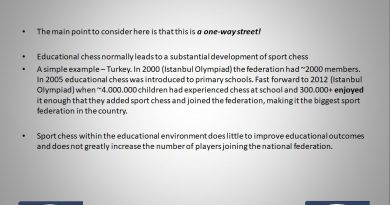The millenary game of chess
by Dr. Uvencio Blanco Hernández

“Chess has a series of characteristics, typical of games, such as: it is a voluntary activity, it has a determined purpose, it has limits, it stimulates cognitive abilities, it promotes values, it models character, it has a therapeutic function, it has a social function and it evolves”.
The game also evolves
There is no human organisation in which play does not exist; it has evolved along with such groups throughout history. That is why, like all other games, chess has been changing, transforming, evolving through time and the socio-cultural contexts in which it has manifested itself.
Chess is an ancient board game played by two people on a square board with 64 squares (half light and half dark), on which two groups of figures face each other (white and black) and whose objective is to checkmate the opposing king.
By its conception, chess is a strategic game in which each player has 16 figures, broken down as follows: a king, a queen, two rooks, two bishops, two knights and eight pawns. And by design, it is a sequential game; in which the players alternate their moves one after the other, always starting with white, then black and so on.
As a game, chess is a voluntary, disinterested and inconsequential act. Indeed, we must point out that chess fulfils a series of characteristics, typical of games, such as: it is a voluntary activity, it has a determined purpose, it has limits, it stimulates cognitive abilities, it promotes values, it models character, it has a therapeutic function, it has a social function and it evolves.
Playing chess is a fun activity that generates pleasure as a consequence of its practice. This implies that it is related to the psychological well-being of the individual, so it tends to reduce the risks of suffering some health problems, both physical and mental, such as states of tension and anxiety.
Chess as a regulated game
Likewise, and in relation to the internal order of chess itself, it is organised around a series of actions that determine a set of explicit rules, which generates a reality different from the everyday. Thus, the game of chess is governed by laws, rules and norms, and is expressed in a specific time, context and place. While it develops, the player is governed by certain rules that are different from everyday ones. The recognition of the rules contributes to the development of self-control in its practitioners; likewise, respect for the rules and objectives is fundamental for development and social integration.
On the other hand, one of the most outstanding characteristics of this game, and considering its wide pedagogical applications, is related to the stimulation that this activity exerts on the expression of certain cognitive skills. Important research suggests that the game of chess facilitates the development of soft skills such as imagination, creativity and the ability to plan and solve problems.
Moreover, being a strategic activity, it promotes the ability to plan and coordinate strategic actions, which in turn stimulates critical, reflective and representative thinking.
Another relevant aspect is that chess is a game that stimulates the recognition and appropriation of values for life; an appropriate tool for teaching everyone, but in particular the youngest, values and virtues such as justice, loyalty, self-improvement, coexistence, respect, companionship, etc.
Precisely because of its playful nature, based on strict rules, norms and principles, chess has much to contribute to the school because it makes an important contribution to the generation of fundamental values such as teamwork, discipline, tolerance, punctuality and responsibility.
In general, in the different games and in chess in particular, there is no discrimination based on race, colour, creed, religion, political inclination, opinion, gender or social status; thus, chess players are taught to respect, recognise and tolerate differences between people.
On the other hand, and as a consequence of the accessibility of chess and not being age, height, weight or general physical condition decisive, this game can be played by blind people, paraplegics and others with marked physical limitations.
Finally, in the FIDE Chess and Education Commission, we emphasise that the game of chess stimulates the development of certain cognitive skills and favours symbolic thinking, which facilitates its civilising action by contributing to the integration of the individual into his or her culture. This implies that chess promotes the development and social integration of its practitioners because, as a game, it is a means of interaction of the individual with others, achieving levels of integration that few activities can achieve; with all that this implies in the construction of the individual as a social being.
Source:
Blanco, U. (2023) Ajedrez, ciencia cognitiva y ajedrez. Amazon.com.

